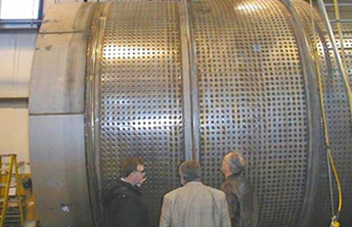麦王技术
Technologies
Release Time:2018-06-07
View Count:7164
Process features:
McWong's engineering customizes client's parameters and designs unique solutions to treat specific contents of wastewater by using mainly membrane and thermal technology in the zero liquid discharge process.
Process Advantages:
Applicable to heavily polluted wastewater
Applicable to highly concentrated saline wastewater
Applicable to minimization of wastewater discharge and maximization of water reuse
Significantly reduces downstream equipment investment, saving more than 50% of operating cost
Applications:
Applicable to coalchemical, petrochemical, chemical, oil extraction and steel-making industries, especially in solving the discharge problem of high concentration of brine
Zero Liquid Discharge Process:

Super Concentration Reusable Membrane
The unique feature of ZLD treatment process is to concentrate the liquid as much as possible via membrane technology before evaporation. Hence higher recovery before evaporation and lower operation cost of evaporation. McWong's SCRM uses specially designed structure of vibrating membrane module which amplifies shearing force on membrane surfaces and increases fluid passage, thus achieving super high concentration before liquid is discharged to evaporation pond or goes to downstream evaporator and / or crystallizer for further treatment.
Membrane concentration technology by enlarging the width of fluid passage
The unique pollution resistance membrane technology can reduce flow resistance while ensuring maximum membrane use area. Unlike traditional roll type membrane, our membrane adopts open type fluid passage design, results in a higher pressure resistance level and prevention of solids and foulants from settling and adhering on membrane surface. The membrane, which was special designed for high concentrated brine waste and heavily polluted water, guarantees maximum throughput.
Technical Advantages
Various types of membranes
Stronger pollutant resistance
High pressure resistance
Principle
Vibration amplifies shearing force on membrane surfaces or increases fluid passage
Specially designed anti-pollutant membrane
Effect
Further concentration of highly concentrated wastewater & reduction of wastewater volume
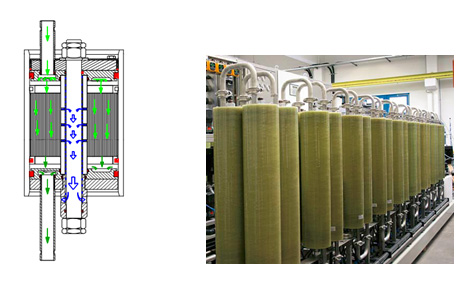
Membrane concentration technology by increasing shearing force on membrane surfaces
The shear waves produced by the membrane's vibration cause solids and foulants to be lifted off the membrane surface and remixed with the bulk material flowing through the membrane stack. In McWONG membrane system, the feed slurry remains nearly stationary, moving in a leisurely, meandering flow between parallel membranes leaf elements. Shear cleaning action is created by vigorously vibrating the leaf elements in a direction tangent to the faces of the membranes. More importantly, the shear is focused at the membrane surface where it is cost effective and most useful in preventing fouling, while the bulk fluid between the membrane disks moves very little. It can further concentrate the highly concentrated wastewater that contains complex pollutants with high TDS.
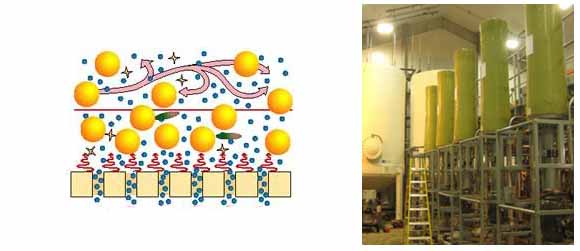
Evaporation + Crystallization Technologies
McWong's evaporation and crystallization systems have 20 years producing and design experience in evaporation and crystallization industries. McWong provides a full range of service including consulting, design, manufacturing, installation, commissioning and operation. McWong will optimize the evaporation method and model after a full evaluation of brine quality, process economy, jobsite location, etc.
Multiple-effect evaporation:
Multiple-effect system consists of several evaporators in series. The first effect is heated directly and next effects are heated by process vapours from the previous effects. The evaporators are thermally linked and thus energy consumption can be reduced up to 50%. By repeating this principle, energy consumption will be considerably reduced.
MVR (mechanical vapor recompression):
Vapor from an evaporator is compressed to a higher pressure so that it can be condensed in the evaporator heat exchanger. MVR evaporator recovers the latent heat, improves the thermal efficiency, decreases energy consumption and reduces pollution.
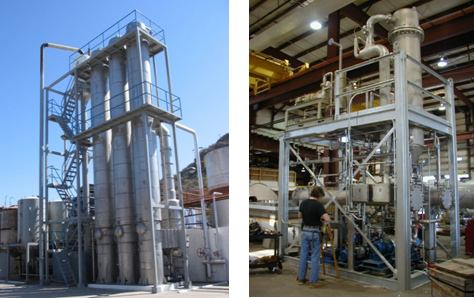
Typical projects
China Coal Mengda 5 Million Tons Engineering Plastics Annual Production Waste Reuse ZLD Project and Wastewater Treatment Project
The water reusing system facility in the 5 million engineering plastics annual production project of Inner Mongolia China Coal Mengda New Energy Chemical Co. Ltd was EPC contracted by McWong. The overall capacity of this project is 13,200m3/d including water from the project's own wastewater equipment and discharged wastewater from water pumping stations and desalination stations. McWong utilized its own patented zero-discharge process package (UF + RO + vibrating membrane + multi-effect evaporation concentration) technology to achieve zero discharge and recycle coal chemical industry wastewater.
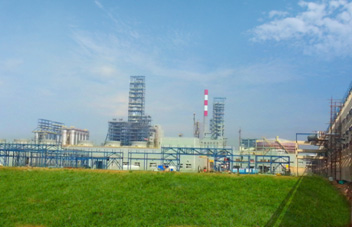
Yangmei Pingding Chemical Co., Ethylene Glycol ZLD Project
The water treatment system in Phase-I construction of YANGQUAN COAL GROUP PINGDING Chemical Co., Ltd Ethylene Glycol Project was EPC contracted by McWong. The water treatment system in this project includes wastewater treatment station, reclaimed water reuse station, condensate refining station, brine treatment station and demineralized water station. McWong utilizes the unique combined process of IBR and MBR to conduct biochemical treatment on the wastewater. For the brine treatment, McWong re-concentrates the RO high-concentrated water with the use of SCRM, which greatly reduces the size of subsequent evaporation device, and also significantly reduces the project investment and operation costs.
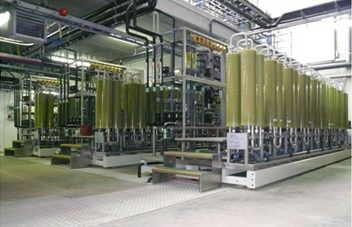
Baotou Huamei Co., Ltd. Ammonium Chloride Wastewater Evaporation and Crystallization Zero Discharge Project
The Ammonium Chloride wastewater evaporation and crystallization treatment system in Baotou HUAMEI RE high-tech Co., Ltd east factory environmental protection facility comprehensive upgrade project was EPC contracted by McWong. The main component in the industrial wastewater from the manufacturing processes is Ammonium Chloride aqueous solution. For energy conservation and emission reduction, as well as the recycling of resources, this wastewater needs to be treated by the evaporation and crystallization treatment system, in order to recycle ammonium chloride crystals and condensate water. The project water treatment capacity is 500m³/d,the concentration of ammonium chloride is 80g/l. Taking advantage of its own unique technology and operation management, McWong is in charge of the engineering design, manufacturing, installation, debugging, operation and other responsibilities for the whole facility.
